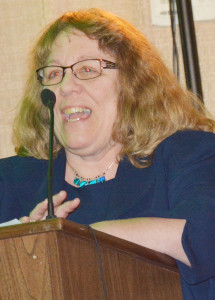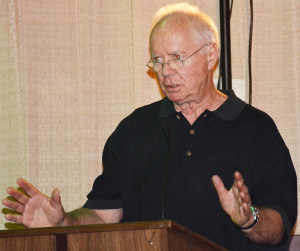 The five members of the Iowa Racing and Gaming Commission were treated as honored guests in Jefferson Thursday, but at the end of the day, no one would envy them for their positions. The IRGC was in Jefferson to tour the community, to see the site of a proposed casino, and to hold a public hearing (as required by law) on the application by Grow Greene County Gaming Corporation and Wild Rose Entertainment to build a $40 million casino in Jefferson.
The five members of the Iowa Racing and Gaming Commission were treated as honored guests in Jefferson Thursday, but at the end of the day, no one would envy them for their positions. The IRGC was in Jefferson to tour the community, to see the site of a proposed casino, and to hold a public hearing (as required by law) on the application by Grow Greene County Gaming Corporation and Wild Rose Entertainment to build a $40 million casino in Jefferson.

The public hearing was held at the Sierra Community Theatre. Jefferson mayor Craig Berry welcomed the commissioners at the outset of the hearing. All 250 seats in the theatre were full, and another 100 persons were in the theatre basement meeting room listening to an audio feed. Commission chair Jeff Lamberti called a recess 2-1/2 hours into the hearing; about half those present did not return after the recess. The hearing went for another two hours, took another recess, and then reconvened for a very brief time of questions for Wild Rose Entertainment president Tom Timmons.
A total of 67 persons addressed the Commission at the hearing. Of those, 21 were in opposition and 46 supported the application.
 Supporters gave much the same information as at the March 6 presentation to the Commission. Many members of Grow Greene County talked about job growth and the need for a convention/hotel/entertainment facility in the county. There was very little mention of casino gambling, and no mention of slot machines. Instead, the project was framed as an economic development tool that would benefit all of west central Iowa.
Supporters gave much the same information as at the March 6 presentation to the Commission. Many members of Grow Greene County talked about job growth and the need for a convention/hotel/entertainment facility in the county. There was very little mention of casino gambling, and no mention of slot machines. Instead, the project was framed as an economic development tool that would benefit all of west central Iowa.
Under the agreement Grow Greene County has with Wild Rose Entertainment, charitable contributions of casino funds would be distributed not only in Greene County, but also in Boone, Calhoun, Carroll, Dallas, Guthrie and Webster counties. Representatives from Boone, Calhoun, Carroll and Guthrie counties spoke in support of the gaming license. Also speaking in support were Region XII Council of Governments executive director Rick Hunsaker and Midwest Partnership executive director Chad Schreck.
Baltimore supports: State Representative Chip Baltimore (R), who represents Greene and Boone counties, spoke in favor of the license application. He spoke of the state legislatures efforts to create an environment that encourages private industries to invest in Iowa, but said that most of those efforts have benefitted urban areas rather than rural areas. He said, as did several other speakers, that “any cannibalization is truly a drop in the bucket for the other facilities we’re looking at in comparison to the economic impact this facility would have here… I would encourage you to do what we cannot do in the state capitol, to allow this license application to be approved and allow this facility to go forward here. Please give them a fighting chance for their future.”
Opposition from the gaming industry: The cannibalization of existing casinos was mentioned often by the opposition to the casino. Prairie Meadows general manager Gary Palmer, Riverside Casino chief executive officer Dan Kehl, and Meskwaki Casino general manager Dan Stromer all spoke against the Greene County application. They referred to studies paid for by the Commission and done by Union Gaming and Marquette Advisors that suggested there would be very little new gaming revenue in the state, with as much as 94 percent of the revenue at a Greene County casino coming from other Iowa casinos. They also reported declining gaming revenues at their facilities. “The timing’s not right for a new casino anywhere in Iowa. A new casino would not introduce any new money into Iowa, just shift entertainment dollars from one licensee to another,” Palmer said.
Kehl suggested that the Commission put a 10 year moratorium on any new casino licenses and require 5-year capital improvement plans from every existing casino.
Stromer said the numbers provided in the studies about market saturation are clear. “At some point in time you ask the question ‘When is one too many? When is enough, enough?’ There’s not a magic formula or a crystal ball, but the numbers are pretty concrete,” he said. “These are not easy decisions. I applaud the group here for the effort they’ve put in, but ultimately at the end of the day, the decision is based not just on what’s good for here, but what’s good for the state of Iowa and the industry.”
While Grow Greene County has been on the Commission’s agenda previously, an organized opposition to the project had not. A group of seven Jefferson residents, not using the name “No Casino Greene County” that was used prior to the Aug. 6 referendum, but referring to themselves as a coalition, spoke Thursday.

Local opposition: The coalition presented to the Commission a tabbed booklet of what speakers called “only the facts.” Don Labate highlighted four criteria of the Code of Iowa relating to gaming licenses and economic development that the Grow Greene County application did not meet. Donna Sutton spoke about consistency from the Commission in licensing, saying that if there were to be another casino in Iowa, it would have been more reasonable to put it in Fort Dodge (the Commission denied a license there in 2010) than in Jefferson. She referred to a study that showed a high market cannibalization rate has repeatedly been a reason for denying new licenses.
Lisa Schroeder said that the statistics reported in the Marquette and Union Gaming studies are solid and that any refutation is by conjecture only. Barb Labate gave recent statistics from Indiana, Michigan, Illinois, Ohio, Missouri, Mississippi and Delaware showing that gaming revenues are declining nationally, with over supply in the market as the cause. She said that in recent figures, 15 of Iowa’s 18 casinos have reported declines in revenue.
Adrienne Smith refuted Grow Greene County’s estimate of new jobs provided by a casino, saying that just as the money coming to a local casino would not be new money but would be coming from other entertainment venues, the jobs at a casino would also be replacing jobs lost due to reduction in those venues. She suggested a figure of 36 new jobs would be more accurate than the 250-275 jobs projected by Wild Rose.
Jefferson United Methodist minister the Rev Julie Poulsen quoted the Methodist Social Principles – “Gambling is a menace to society, deadly to the best interests of moral, social, economic and spiritual life, destructive of good government and good stewardship,” She said there are better ways to raise charitable funds than gaming, and told of how divisive the issue has been in the community.
Bill Sutton was the last of the coalition to speak. He presented a cash flow analysis that shows a loss of revenue in Carroll, Boone, Webster and Dallas counties resulting from the Greene County project.
Among all the speakers, there were two who surprised many people in their positions.

Support from “the father of Prairie Meadows”: Richard Wilkey retired as Des Moines city manager in 1985 and then was instrumental in organizing Prairie Meadows as a non-profit organization. It was Wilkey who put together the financing for the Prairie Meadows racetrack. In 1999, he was lauded as “the father of Prairie Meadows,” he told the Commission. “I’m very proud of Prairie Meadows. It’s Iowa’s place to play and stay,” he said. It has also been a catalyst for development in Altoona, he added.
He went on to tell the Commission that his wife is from Greene County and he has relatives in the county. He named Greene County Chamber executive director for tourism and events Chris Henning, along with the Minnehan and Tasler clans. “We have a stake in this,” he said. “I strongly support this project of a hotel and casino…. Prairie Meadows is going to be just fine whether the project is built or whether it isn’t. They’re going to be in good shape; they’re a dynamic group. I wouldn’t stand here if I thought Prairie Meadows was going to deteriorate. I wouldn’t be here because my heart is in the Prairie Meadows project.”
Wild Rose Emmetsburg sponsoring organization opposes: The second surprise came from Renee Jedlicka, vice president of the Palo Alto County Gaming Development Corporation, the sponsoring organization that holds the license for Wild Rose – Emmetsburg. “I am reluctant to let you know that we are opposed to the project,” she told the Commission. She said it was an awkward position because that board feels it has a positive relationship with Wild Rose. “After looking at the independent studies, there is no way that we could not oppose the Greene County casino,” she said.
The studies project a 10 percent reduction in gaming revenues in Emmetsburg with a Jefferson casino. That figure has not been problematic for Wild Rose Entertainment, but Jedlicka said it would be a “significant hit” for Palo Alto County, resulting in the loss of about 30 fulltime jobs. “If the people in Greene County were in our same position, they’d be here saying this to you, too. That’s a huge hit for our small, rural county,” she said. She added that the larger concern down the road is funding for capital improvements at Wild Rose – Emmetsburg should revenues decline.
Seven representatives from various horse breeding groups talked about the impact decreased revenues at Prairie Meadows would have on purses at the racetrack there. Those purses are set as a percentage of revenues. They projected a loss of $1.7 million in purses and noted that would spur a decline in horse racing in the state.
Representatives of Blank Park Zoo, the Iowa chapter of the ALS Association, and Character Counts talked about the financial support their groups have had from Prairie Meadows contributions.
Rick Morain of Grow Greene County provided a comparison of annual gaming receipts and charitable contributions by Prairie Meadows, and said that gaming revenues are not the only factor in setting the amount of charitable contributions.
Competition in the gaming market: Morain talked about Prairie Meadows’ opposition, recalling the addition of table games there 10 years ago. That caused an immediate 15 percent loss in revenue at Lakeside Casino (then Terrible’s) in Osceola. “I doubt that Prairie Meadows folks at that time gave much shrift to the cannibalization objections raised by Osceola… Now the shoe is on the other foot for Prairie Meadows, but it doesn’t pinch there nearly as tightly as it did in Osceola,” Morain said.
Guy Richardson, a Grow Greene County member and a Greene County supervisor, also talked about competition in the casino market. He said negative impacts have been over-stated. “What this is really all about is competition. Those folks don’t want this competition,” Richardson said. He said the Commission doesn’t tell licensees there will be no competition, but that it works to assure new competition doesn’t destabilize the market. “We believe we have presented sound reasons why you should support this application. It will be tremendously disappointing if we fail to convince you that the merits of this project far outweigh any drawbacks,” he said.
Mike Mumma, attorney for Grow Greene County, was the last speaker at the public hearing. He said he found Palo Alto County’s “11th hour” opposition “perplexing,” noting that the group helped organized speakers at a pair of bus trips to Emmetsburg and sent speakers to Greene County town hall meetings last summer in support of the project. Mumma also said that those who oppose a casino for moral reasons, and those who think there should be no more gaming licenses in Iowa, should seek redress with the state legislature, not the Racing and Gaming Commission.
Following all testimony, Racing and Gaming Commission chair Lamberti questioned Wild Rose Entertainment president Timmons about site and building planning and financing for the project. Timmons said planning is done so that should the Commission approve the license, site preparation could begin before the end of June, with completion of the facility next July. Financing will be done through a refinance of the Wild Rose casinos in Clinton and Emmetsburg, using equity in those facilities to minimize the risk of financing of the Jefferson facility.
The Racing and Gaming Commission meets next at Catfish Bend Casino in Burlington on June 12. The Commission will announce its decision regarding the Grow Greene County application at that meeting.
For a list of all speakers at the public hearing, click here: Speakers

